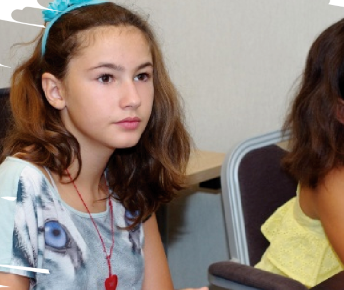Tests in English and final report of the camper
International LuckyKids camp has two types of tests for each of the participants.
- A test to determine the entry level of the child.
- An exit test to determine the level of acquirement of the material during the child’s stay in the camp.

It takes place in the afternoon of the first day of the camp as an integral part of the process of the child’s adaptation to the new environment.
It’s extremely important for all children to arrive on time for the first day and participate in the testing and the initial instructions. This entire process has a soothing effect and helps them with overall adaptation.
With this test we guarantee that each child will be placed in the most appropriate level of education during his or her stay at the camp.
Children of all levels except for the beginner’s level are to complete the universal entry test.
The entry test is different for small children who cannot read and write. It consists mainly of pictures which help children to get to the correct answers.
At beginner’s level the teacher plays a major role in conducting the tests. They help each child understand the question and the instruction so that he or she can perform the task.
In addition to a written test, all teachers take the time to talk to the kids to check how much they use the language in conversations, whether they feel comfortable to use it and whether they are worried about making mistakes.
Often with children the so-called “Language barrier” is created when they are permanently corrected for improper pronunciation of a word or phrase in a foreign language. Knowing which child has a problem in this respect, LuckyKids teachers can work with him or her on free expression, encouraging the child and supporting his or her attempts to speak in English without the negative influence of continuous correcting. To demonstrate the correct pronunciation of a word or phrase teachers use a special technique to repeat the word or phrase so that the child can hear it without being reproached with mispronouncing it.
In the beginner’s level besides a conversation, during the test the teacher can see which child is open to the use of a foreign language and which one feels seriously uncomfortable in front of the unknown. Often in the beginner’s level we resort to a variety of games and activities to help children relax and show them that English is not scary.
The test for determination of the level of acquirement of the material
The test for determination of the level of acquirement of the material is individual for each camp shift. Its contents are determined by the subject matter on which the shift is working and contains grammar, words and expressions the children have learned during their stay in the camp.
This test has closed-end questions and is done in the morning of day 7 or day 14 depending on the type of stay chosen for each child.

For the smaller children the test consists of pictures (same as the entry level one) and depends on the material the children have worked on during the current shift.
The exit test aims to give teachers a clear idea of the percentage of material acquirement and allows for the observation of the dynamics in each group. The test also shows teachers the specific individual qualities of each child which they later describe in the final report for the parent.
Entry and exit tests have different functions. The reported number of correct answers for each child in the entry and exit test cannot be compared to each other due to the different criteria and the different value of each test.
By request, each parent can receive the results of both the entry and exit test.
An integral part of the end of the camp’s educational process is the prepared by the children presentation. The children present their work right after the test.
All presentations relate to the teacher’s final analysis, which is summarized in the so-called report on the camper.
Report of the child’s stay at the camp:
At the end of each camp parents receive an e-mail about the overall behavior and achievements of the child in the camp. The contents of this report include all studied subjects, the grammar taught and the teacher’s recommendation.
The LuckyKids’ international camp report is of analytical and not an evaluative nature. By monitoring the child’s performance, teachers provide recommendations and guidance on how to improve their knowledge in the future. Recommendations can be provided to teachers who work with the children during the school year in order to support the learning process. They are important because the child has been placed in an environment different from school. In the camp atmosphere children often show qualities and characteristics that would emerge with difficulty in the class room.
Attitudes towards the tests and their impact on the child’s mind:

At LuckyKids international camp we often see kids who are very worried about the entry and exit level tests.
At LuckyKids we know how pressuring the continuous written exams, tests and term tests can be for each child during the school year. It is common practice in schools for children to be given surprising tests in order to “punish” and “reproach” their “disobedience” in class. A very important factor is that these tests are evaluative – the child is assessed regardless of the nature of the test. That is why the attitude of the children towards control tests should not come as a surprise.
In combination with all the written exams that children take – matriculations, national assessment, etc., these exams and tests have a very negative impact on the learning process.
In the world practice there is a tendency to minimize written and oral tests of evaluative nature in the early childhood.
The camp team explicitly explains to every child that the tests we are conducting do not aim at evaluating the child’s knowledge. For most children in school-age this is of the utmost importance. They feel much more relaxed and show much more of their abilities when they know that no one will give them a “poor”, a “fair” or an “excellent” on the test.
Our recomendations
We recommend that each parent prepares the child beforehand and inform him or her on the meaning of the tests at the camp. This is especially important in the following cases:
- The child is shy
- The child find it difficult to adapt to a new environment
- The child is at the camp for the first time
- The child has a beginner’s level of English
- The child is strongly attached to his or her family surroundings
- The child is an introvert and has difficulties in communication with peers
The camp team is available for all sorts of additional questions on the subject.
From June 20 to September 5
Teachers with native English
4 hours of interactive English language instruction
